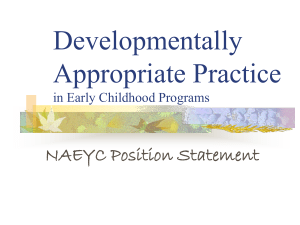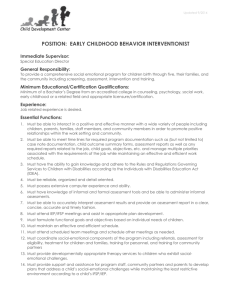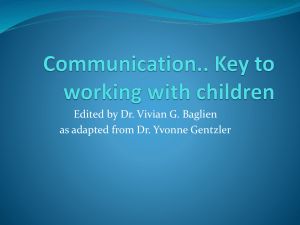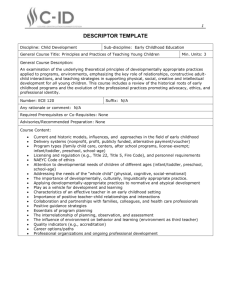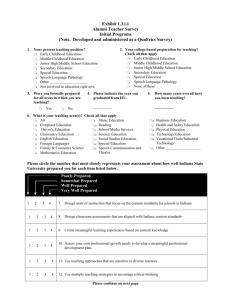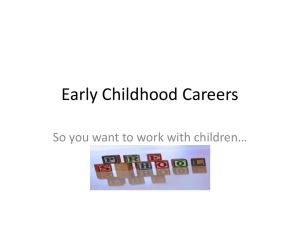Early Childhood/Elementary/Middle Level Education Department
advertisement
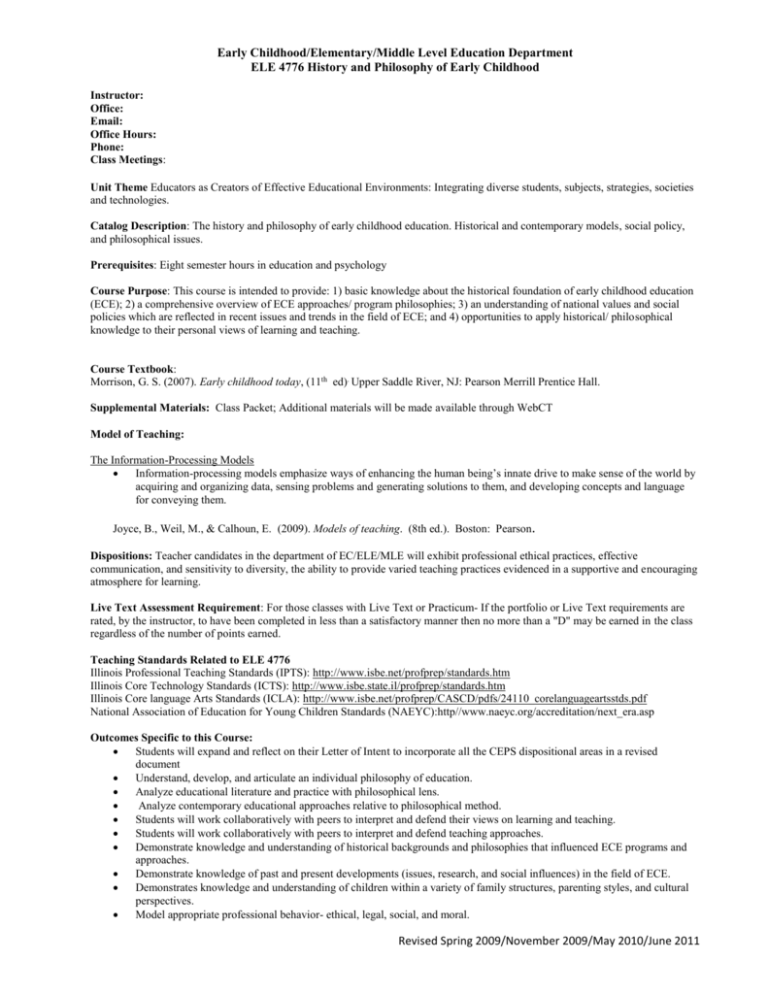
Early Childhood/Elementary/Middle Level Education Department ELE 4776 History and Philosophy of Early Childhood Instructor: Office: Email: Office Hours: Phone: Class Meetings: Unit Theme Educators as Creators of Effective Educational Environments: Integrating diverse students, subjects, strategies, societies and technologies. Catalog Description: The history and philosophy of early childhood education. Historical and contemporary models, social policy, and philosophical issues. Prerequisites: Eight semester hours in education and psychology Course Purpose: This course is intended to provide: 1) basic knowledge about the historical foundation of early childhood education (ECE); 2) a comprehensive overview of ECE approaches/ program philosophies; 3) an understanding of national values and social policies which are reflected in recent issues and trends in the field of ECE; and 4) opportunities to apply historical/ philosophical knowledge to their personal views of learning and teaching. Course Textbook: Morrison, G. S. (2007). Early childhood today, (11th ed). Upper Saddle River, NJ: Pearson Merrill Prentice Hall. Supplemental Materials: Class Packet; Additional materials will be made available through WebCT Model of Teaching: The Information-Processing Models Information-processing models emphasize ways of enhancing the human being’s innate drive to make sense of the world by acquiring and organizing data, sensing problems and generating solutions to them, and developing concepts and language for conveying them. Joyce, B., Weil, M., & Calhoun, E. (2009). Models of teaching. (8th ed.). Boston: Pearson. Dispositions: Teacher candidates in the department of EC/ELE/MLE will exhibit professional ethical practices, effective communication, and sensitivity to diversity, the ability to provide varied teaching practices evidenced in a supportive and encouraging atmosphere for learning. Live Text Assessment Requirement: For those classes with Live Text or Practicum- If the portfolio or Live Text requirements are rated, by the instructor, to have been completed in less than a satisfactory manner then no more than a "D" may be earned in the class regardless of the number of points earned. Teaching Standards Related to ELE 4776 Illinois Professional Teaching Standards (IPTS): http://www.isbe.net/profprep/standards.htm Illinois Core Technology Standards (ICTS): http://www.isbe.state.il/profprep/standards.htm Illinois Core language Arts Standards (ICLA): http://www.isbe.net/profprep/CASCD/pdfs/24110_corelanguageartsstds.pdf National Association of Education for Young Children Standards (NAEYC):http//www.naeyc.org/accreditation/next_era.asp Outcomes Specific to this Course: Students will expand and reflect on their Letter of Intent to incorporate all the CEPS dispositional areas in a revised document Understand, develop, and articulate an individual philosophy of education. Analyze educational literature and practice with philosophical lens. Analyze contemporary educational approaches relative to philosophical method. Students will work collaboratively with peers to interpret and defend their views on learning and teaching. Students will work collaboratively with peers to interpret and defend teaching approaches. Demonstrate knowledge and understanding of historical backgrounds and philosophies that influenced ECE programs and approaches. Demonstrate knowledge of past and present developments (issues, research, and social influences) in the field of ECE. Demonstrates knowledge and understanding of children within a variety of family structures, parenting styles, and cultural perspectives. Model appropriate professional behavior- ethical, legal, social, and moral. Revised Spring 2009/November 2009/May 2010/June 2011 Course Requirements Participation Demonstrated Competencies Performance includes attendance, participation and preparation for group and whole class discussions. Aligned Standards IPTS: 1, 9, 10, 11 ICTS:4, 5, 6, 7 ICLA: 2 NAEYC:5 Dispositions: SDE, EC. IWS, PEP Letter of Intent (Reflection) Students will expand and reflect on their Letter of Intent to incorporate all the CEPS dispositional areas in a revised document Model appropriate professional behavior- ethical, legal, social, and moral. IPTS: 3, 4, 5, 6, 7, 9, 10, 11 ICTS: 1, 2, 3, 7, ICLA: 1, 2, NAEYC: 4, 5 Dispositions: SDE, EC, PEP, IWS, PTSL Tests and examinations Tests and examinations are one form of assessments of students’ content knowledge about philosophy and programs in early childhood education. IPTS: 1, 2, 3, 8 ICTS: 7,8 ICLA: 2, NAEYC: 1, 3,4 Dispositions: EC Critical Examination of an Issue in Early Childhood Education Analyze educational literature and practice with philosophical lens. Demonstrate knowledge and understanding of historical backgrounds and philosophies that influenced ECE programs and approaches. Demonstrate knowledge of past and present developments (issues, research, and social influences) in the field of ECE. IPTS: All ICTS: 1,2, 5,7,8 ICLA: 2, 3 NAEYC: All Dispositions: SDE, EC, PTSL, PEP Demonstrates knowledge and understanding of children within a variety of family structures, parenting styles, and cultural perspectives. Philosophy of Education Understand, develop, and articulate an individual philosophy of education. IPTS: All ICTS: 1, 3 ICLA: 1, 2, 3, NAEYC: All Dispositions: SDE, EC, PTSL, PEP, IWS Comparison of Contemporary Educational Approaches Performance includes a project on comparing different early childhood educational approaches and philosophies in early childhood education. The use of technology will be integrated into this project. Analyze contemporary educational approaches relative to philosophical method. IPTS: All ICTS:1,2,5,7,8 ICLA: 2, NAEYC: All Dispositions: SDE, EC. IWS, PEP, PTSL Students will work collaboratively with peers to interpret and defend teaching approaches. Demonstrate knowledge and understanding of historical backgrounds Revised Spring 2009/November 2009/May 2010/June 2011 and philosophies that influenced ECE programs and approaches. Demonstrates knowledge and understanding of children within a variety of family structures, parenting styles, and cultural perspectives. Core Assignments Brief Description Points/Due Date Approximate Weight Participation Performance includes attendance, participation and preparation for group and whole class discussions. 10% Letter of Intent (Reflection) Carefully review the list of dispositional areas adopted by CEPS and reflect upon the letter of intent you initially submitted. Revise your original letter of intent to address each of the dispositional areas. What experiences in your teacher preparation program have provided you opportunities to exhibit and develop these dispositions? Why are these dispositional areas important for your career as an educator? 15% Tests and Examination Tests and examinations consist of multiple measures, including multiple choice, short answers, and essay questions. Questions will be derived from lecture, assigned readings, article handouts and class discussions. 20% Critical Examination of an Issue in Early Childhood Education Students will individually research an issue in early childhood education and develop a paper analyzing the philosophical basis for the various perspectives on this issue. The issue must be current and significant to the early childhood field. The paper should be at least 5-pages long with references and written in APA style. 20% Philosophy of Education Students will write a paper (a minimum of 5 pages) on their philosophy and beliefs about teaching and the learning of young children and their families in order to articulate an individual philosophy of education. 20% Comparison of Contemporary Educational Approaches Compare and contrast two or more types of early childhood approaches from different perspectives (philosophy, daily schedules and activities, assessments and evaluations, teacher's role, parental involvement, etc). The project will be presented in class. Utilization of technology in the project will be part of the assessment. 15% DETAILED INSTRUCTIONS AND EXPECTATIONS FOR EACH ASSIGNMENT WILL BE PROVIDED BY THE INDIVIDUAL INSTRUCTOR Revised Spring 2009/November 2009/May 2010/June 2011 Graduate Students; Students receiving graduate credit must meet graduate level requirements for this class. An expanded assignment/additional assignment is required in order to receive graduate credit in this course. One option would be the completion of a theory to practice project paper to include a minimum of 12 pages with 10 sources. The nature of this assignment may vary and will be determined after consultation between the individual student and the instructor. Grading Scale: A= 92%-100%, B= 82%-91%, C= 72%-81%, D= 62%-71%, F= 61% and below Course Overview This course covers five topics in early childhood programs and philosophy: 1) early childhood education and professional development, 2) the foundations of history, theories, and philosophies in early childhood education, 3) programs and services for children and families, 4) the new world of early childhood education, and 5) meeting the special needs of young children. COURSE OUTLINE A. Contributions from the Past a. Influences from classical sources (three weeks) i. Comenius ii. Rousseau iii. Froebel iv. Pestalozzi v. Montessori vi. Locke b. Early Growth of Educational Efforts (two weeks) i. Kindergarten in Europe and North America ii. Origins of nursery schools iii. Child care facilities B. Methodological Philosophies (three weeks) a. The normative-descriptive approach b. The humanistic school c. Behaviorism and shaping techniques d. Piaget’s interpretations of growth e. Erikson’s early ages and stages f. Vygotsky’s zone of proximal development g. Dewey’s Progressivism h. Waldorf’s view of nature and the environment i. Gardner’s multiple intelligences C. Theoretical Foundations of Contemporary Educational Approaches a. The Project Approach b. Bank Street Approach c. Reggio Emilia’s Approach d. The Waldorf Approach e. The Montessori Approach f. The Pyramid Method g. Spectrum Approach h. The High/Scope Model i. The Portage Model D. National Values and Social Policy (two weeks) a. The Federal Government: Supporting Children’s Success b. Supporting Children’s Success at the State Level c. Historical perspective of legal and ethical rights of young children E. Perspectives on Diversity: (two weeks) a. Past and Present i. Suppression of Cultural Diversity ii. Melting Pot/ Issues with migration and immigration 1. Family Structure(s) 2. Language iii. “Add-On” Multiculturalism iv. Bilingualism/Biculturalism v. Anti-bias Education b. Preparing to Teach from an Anti-bias Perspective (three weeks) Revised Spring 2009/November 2009/May 2010/June 2011 Academic Integrity "The Department of EC/ELE/MLE is committed to the learning process and academic integrity as defined within the Student Conduct Code Standard I. "Eastern students observe the highest principles of academic integrity and support a campus environment conducive to scholarship." Students are expected to develop original and authentic work for assignments submitted in this course. "Conduct in subversion of academic standards, such as cheating on examinations, plagiarism, collusion, misrepresentation or falsification of data" or "submitting work previously presented in another course unless specifically permitted by the instructor" are considered violations of this standard." Student Success Center Students who are having difficulty achieving their academic goals are encouraged to first contact their instructor. If needing additional help, please contact the Student Success Center (www.eiu.edu/~success) for assistance with time management, test taking, note taking, avoiding procrastination, setting goals, and other skills to support academic achievement. The Student Success Center provides individualized consultations. To make an appointment, call 217-5816696, or go to 9th Street Hall, Room 1302. ELE 4776 References Brosterman, N. (2002). Inventing kindergarten. NY: Harry Adams. Bredekmap.S., & Cople, C. (1997). Developmentally appropriate practice: Serving children birth through age 3. NY: National Association of Education for Young Children. Bodrova, E.D., Leong, D., & McAfee, O. (2004). Basic assessment: Primer for early childhood educators. Washington, D.C: National Association of Education for Young Children. Cadwell, L.B., & Rinaldi, C. (2003). Bringing learning to life: A Reggio approach to early childhood education. NY: Teachers College Press. DeVaries, R. (2002). Developing constructivist early childhood curriculum: Practical principles and activities. NY: Teachers College Press. Herschkowitz, E. C., & Kagan, A. (2004). A good start in life: Understanding you child’s brain and behavior. Malden, MA: Joseph Henry Press. Hendrick, J. & Weissman, P. (2007). Total learning: Developmental curriculum for the young child. Upper Saddle River, NJ: Merrill/Prentice Hall. Lascarides, V. & Hinitz, B. (2000). History of early childhood education. NY: Falmer Press. Isenberg, J.P. & Jalongo, I. (2003). Major trends and issues in early childhood education: Challenges, controversies and insights. NY: Teachers College Press. Mooney, C. (2000). Theories of childhood: An introduction to Dewey, Montessori, Erikson, Piaget & Vygotsky. St.Paul, MN: Readleaf Press. Morrow, L. M. (2004). Literacy development in the early years. Boston: Allyn & Bacon. Newby, T.J., Stepich, J., Lehman, J., & Russell, J. D. (2006). Educational technology for teaching and learning. Upper Saddle River, NJ: Merrill/Prentice Hall. Revised Spring 2009/November 2009/May 2010/June 2011 Roopnarine, J. & Johnson, J. (2005). Approaches to early childhood education. Upper Saddle River, NJ: Merrill/Prentice Hall. Saracho, O., & Spodek, B. (2003). Studying teachers in early childhood settings. Greenwich, CT: Information Age. Spietz, H. A. (2002). Montessori resources: A complete guide to finding Montessori materials for parents and teachers. Roosmoor, CA: American Montessori Consulting. Zigler, E., & Styfco, S.J. (2004). The Head Start debates. Baltimore: Brookes. Wolfe, J. (2002). Learning from the past: Historical voices in early childhood education. Alberta, Canada: Piney Branch Press. Wright, K.D., Stegelin, A., & Harris, L. (2007). Building family, school, and community partnerships. Upper Saddle River, NJ: Merrill/Prentice Hall ******************************************************************************************************* Students with Disabilities: If you have a documented disability and wish to discuss academic accommodations, please contact the Office of Disability Services at 581-6583. 3/25/11 Revised Spring 2009/November 2009/May 2010/June 2011

